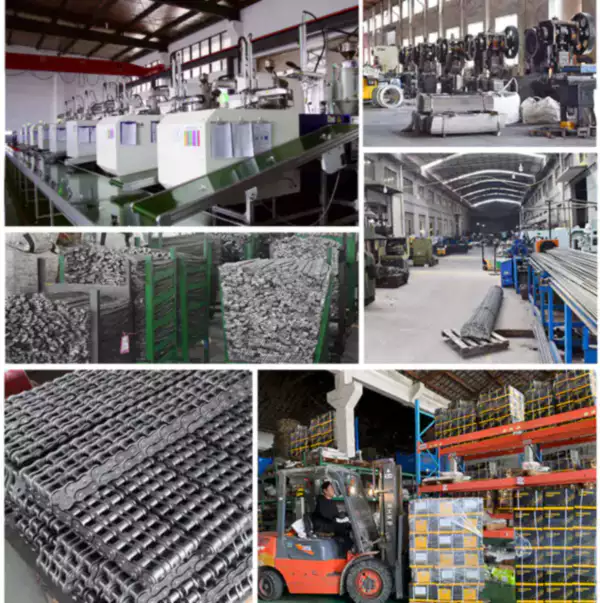Table of Contents
- Introduction
- Overview of Gripper Chains
- Environmental Concerns
- Benefits of Using Gripper Chains
- Impact on Manufacturing Efficiency
- Future Developments
- Conclusion
Introduction
Gripper chains are an essential component in the manufacturing industry, playing a crucial role in various processes. This blog article aims to explore the environmental impact of using gripper chains in manufacturing and shed light on the significance of sustainable practices.

Overview of Gripper Chains
Gripper chains are specialized chains designed to provide a reliable grip on different materials during manufacturing operations. They consist of interconnected links with protrusions, ensuring secure handling and transportation of products throughout the production line.

Environmental Concerns
The use of gripper chains in manufacturing has raised concerns regarding its environmental impact. The production of gripper chains involves the extraction and processing of raw materials, which can contribute to habitat destruction and pollution. Additionally, the energy-intensive manufacturing processes and the disposal of worn-out chains can further contribute to carbon emissions and waste accumulation.

Benefits of Using Gripper Chains
Despite the environmental concerns, gripper chains offer several benefits that contribute to efficient manufacturing processes. Firstly, they ensure secure and reliable handling of materials, reducing the risk of accidents and product damage. Secondly, gripper chains enable precise positioning and alignment of products, enhancing overall production accuracy and quality. Additionally, their durability and long lifespan minimize the need for frequent replacements, reducing material waste.
Impact on Manufacturing Efficiency
Gripper chains play a vital role in optimizing manufacturing efficiency. With their ability to securely grip and transport materials, they facilitate smooth and continuous production flow. This results in reduced downtime, increased productivity, and ultimately, cost savings. The integration of gripper chains in manufacturing systems promotes streamlined operations, enabling manufacturers to meet market demands effectively.
Future Developments
The manufacturing industry is continuously evolving, and so are gripper chains. Researchers and manufacturers are exploring innovative materials and designs to enhance sustainability and minimize environmental impact. The development of eco-friendly materials and energy-efficient manufacturing processes is a promising direction for the future of gripper chains.
Conclusion
The environmental impact of using gripper chains in manufacturing cannot be ignored. While they offer significant benefits in terms of efficiency and productivity, it is crucial for manufacturers to prioritize sustainable practices. By adopting eco-friendly materials, promoting recycling and responsible disposal, and investing in energy-efficient manufacturing processes, the industry can minimize the environmental footprint of gripper chains.
Sprockets for Gripper Chains
Sprockets are indispensable components that complement gripper chains, ensuring smooth and precise motion. The relationship between gripper chains and sprockets is mutually beneficial, as they work together to optimize manufacturing processes. Sprockets provide the necessary teeth or grooves that interlock with the links of gripper chains, enabling controlled movement and efficient material handling. At our company, we offer a wide range of sprockets that are compatible with gripper chains. Our sprockets are designed with precision and durability in mind, ensuring reliable performance and maximizing the lifespan of gripper chains. Take a look at the image below for a visual representation of our grip chain sprockets.

Our Advantages
- 1. Extensive experience in gripper chains manufacturing
- 2. High-quality materials and advanced production techniques
- 3. Customizable solutions to meet specific requirements
- 4. Prompt and reliable customer support
- 5. Competitive pricing and efficient delivery

Q&A
Q: Can gripper chains be recycled?
A: Yes, gripper chains can be recycled. However, it is essential to separate them from other materials to ensure proper recycling. Recycling gripper chains helps reduce waste and conserve valuable resources.
Q: Are gripper chains suitable for heavy-duty applications?
A: Absolutely! Gripper chains are designed to withstand heavy loads and harsh manufacturing environments. Their sturdy construction and reliable grip make them ideal for demanding industrial applications.
Q: How often should gripper chains be inspected for wear?
A: Regular inspections are recommended to ensure the optimal performance of gripper chains. The frequency of inspections depends on factors such as usage intensity and operating conditions. It is advisable to follow the manufacturer's guidelines for maintenance and replacement.
Edited by Zqq.
